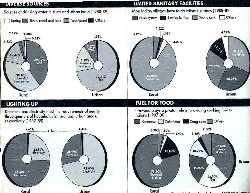First food: business of taste
Good Food is First Food. It is not junk food. It is the food that connects nature and nutrition with livelihoods. This food is good for our health; it comes from the rich biodiversity of our regions; it
Good Food is First Food. It is not junk food. It is the food that connects nature and nutrition with livelihoods. This food is good for our health; it comes from the rich biodiversity of our regions; it

Living conditions remain abysmally poor in India, with a big difference between urban and rural areas. Nearly three-quarters of urban households lived in pucca houses, compared to only about a

A recent congress highlighted the relevance of people oriented science and technology such as the management of water, forests and agriculture.
Twenty-two years ago, the publication of a book, Indian Science and Technology in the 18th Century, by an unknown Gandhian, DHARAMPAL, took the academic world by storm. Until then, science in India was thought to be a Western import. Apologists of the Bri
The present framework for NGO involvement and environment education is based on a background of visits to a large number of PAs over the last tow decades and recent visits to TRs with a more specific purpose of focusing atentionon these issues.
Duplicate samples of the diet of vegetarian adults were analyzed to estimate the residues of dichloro-diphenyl-trichloroethane (DDT) and benzene hexachloride (BHC). The total food consumed by an adult
<p>In fifty developing countries, which contain half of the total human population of the world, there is a heavy dependence on draught animals as an energy source. These animals are used for agriculture
Ministry of Environment and Forests constituted on May 24, 1994, a committee to look into the issues relating to illegal trade in wildlife species. The committee was requested to look into the issues related to the illegal trade in wildlife and suggest ways and means to improve the existing control measures.

The North-South divide is not a fabrication: for three-fourths of the world, it is a fact of daily existence. Ignoring it will not make it disappear but only exacerbate the wounds.
A journalist without the pretensions of a scientist that's how JOHN MADDOX, editor of Nature for 15 years, would like to see himself. On his recent tour of India, Maddox talked to SUMANTA PAL on what went wrong with science and scientific establishment
Self sustaining rural communities could be India's answer to her disrupted ecosystem.